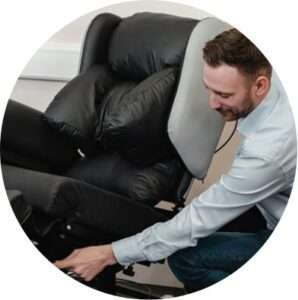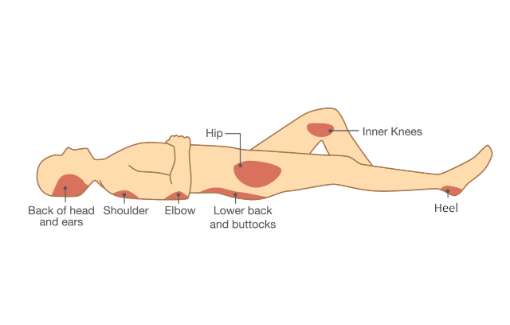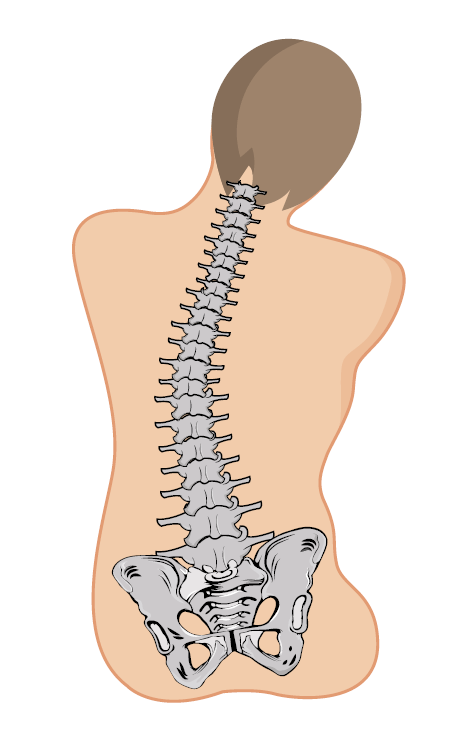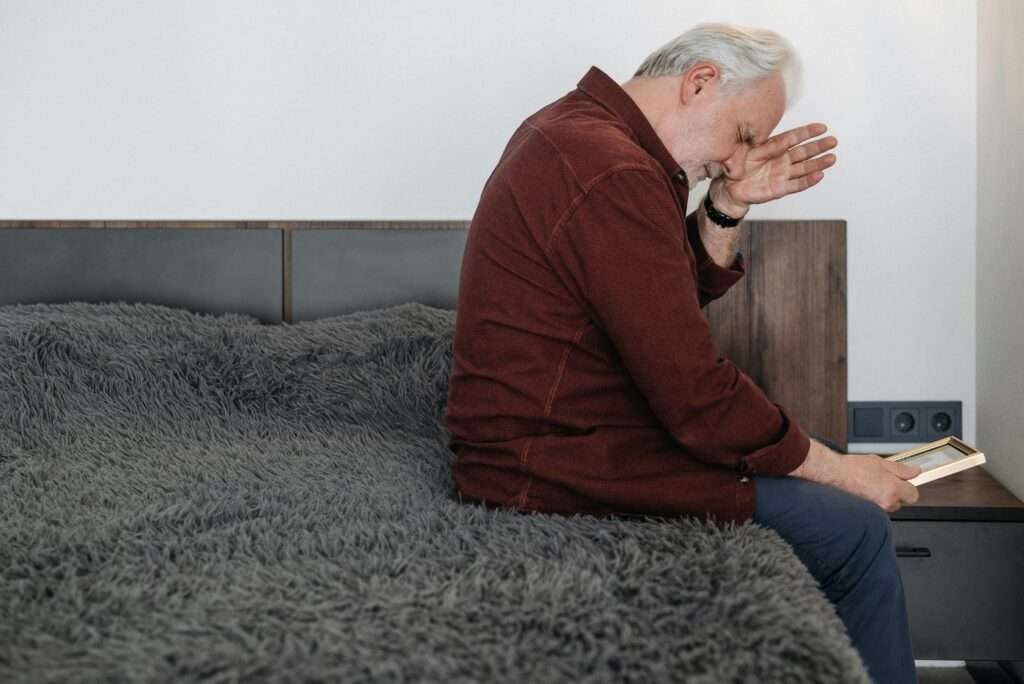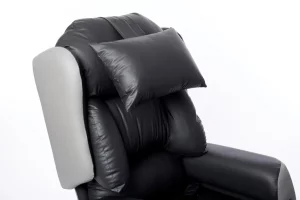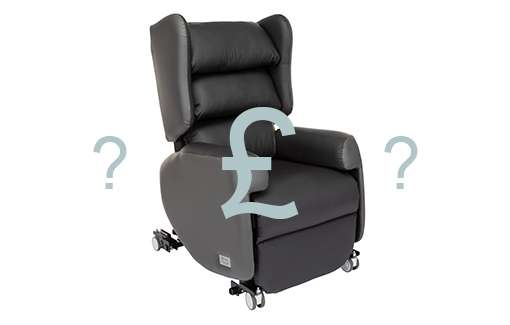Multiple Sclerosis (MS) is a neurological disorder caused by damage to the central nervous system. There is no complete cure for MS, but there are lots of treatment options to help ease symptoms and improve quality of life for sufferers.
MS causes fatigue, muscle spasms and cramps, and problems with balance and coordination. Choosing a chair that facilitates the right treatment and therapy will help MS sufferers improve their wellbeing and relieve pain and discomfort.
Symptoms of MS tend to fluctuate, known as ‘relapsing remitting’, so adjustability is a key feature that needs to be built into seating to provide for these changes in symptoms.
Jump straight to...
What is Multiple Sclerosis and How Does the Condition Present?
Multiple Sclerosis (MS) is a neurodegenerative disease, caused by an autoimmune disorder where the body’s immune system attacks the nerves between the brain and spinal cord, damaging the myelin sheath (sclerosis). This confuses the messages transmitted by the nerve fibres, causing an array of physical and cognitive symptoms. These symptoms vary widely, depending on the extent of the nerve damage and which areas are affected most.
These are some of the main symptoms presented by people with MS:
- Fatigue
Tiredness and fatigue can be debilitating and affect a person’s day-to-day functioning and wellbeing. Resistance exercises can help increase and maintain their energy levels.
- Blurred vision
Vision problems and dizziness can lead to a loss of balance, causing changes in gait and an increased risk of falls.
- Poor bladder control
Pelvic floor physiotherapy can help manage bowel or bladder dysfunction.
- Numbness/tingling in different areas of the body
Sensory problems and lack of feeling in certain areas of the body can be helped with physiotherapy exercises.
- Muscle spasms and cramps
Spasticity and stiffness can be alleviated by hydrotherapy (water immersion), performing exercises underwater where the impact of gravity is lower.
- Problems with balance and coordination
PoNS Therapy can help improve walking and balance for people with mild to moderate MS symptoms.
Physical Characteristics of MS and How the Lento Neuro can Help
The Lento Neuro has been launched as a game-changing chair for patients with neurological conditions, particularly helpful for those with involuntary movements. True to the Lento range, it is fully adjustable so can be resized to suit any individual, and has standardised removeable parts that can be renewed and recycled whenever necessary.
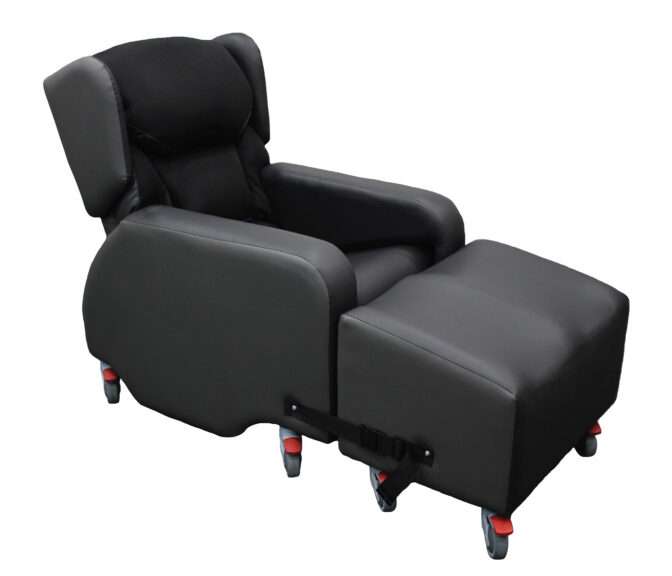
Lento Neuro chair
Muscle Weakness
MS can cause weakness on one side of the body, making it difficult to maintain an upright posture. The angled seat rake in the Lento Neuro helps the patient maintain a good midline position. The extra postural adjustments help prevent leaning, such as increasing the back angle to create more of a lying position, and adding in extra lateral supports.

Lento Neuro raked seat
Muscle Spasms and Cramps
The chair is upholstered in a soft wicking fabric and dartex material, to make the patient as comfortable as possible and reduce pain and surface pressure.
The soft, yielding fabric and high pressure relief qualities of the chair are helpful if the patient is numb in certain areas of the body, or does not have enough biofeedback to know when to alter their posture.
The chair pivots from the front to recline back up to 38 degrees, to easily readjust the sitting position and relieve pain and stiffness.
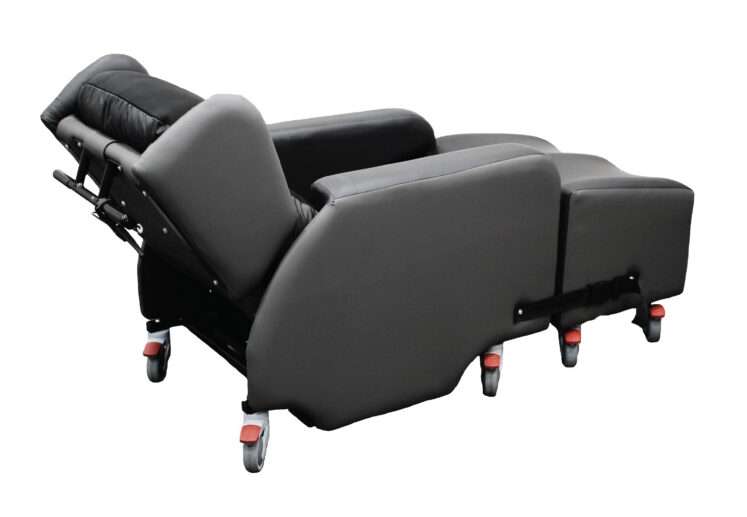
Lento Neuro with reclined backrest
Incontinence
Some MS patients suffer from incontinence, which is easy to manage in the Lento Neuro with its removeable cushions and backrest that can be easily wiped clean.
Fatigue
Lower energy levels and mobility problems mean some MS sufferers will be seated for longer periods of time. The variable seat angle and cocoon-shaped seat make the patient feels comfortable and supported for longer periods. Enhanced pressure features like breathable fabric and coolgel cushions keep the skin comfortable and pressure-free.
Wheelchair users with MS show significant increases in interface pressure over time, suggesting that longer sitting periods may increase risk for pressure-related complications, and that pressure mapping can inform the best seating duration and cushion selection.
Additionally, pressure mapping can detect differences in postural control among MS patients compared to other neurological conditions, indicating that seating interventions may need to be individualised.[1-2]
Balance and Coordination Problems
Damage to the nerve cells confuses the messages transmitted to the brain, causing problems with coordination and movement.
The Lento Neuro is great for people with involuntary movements, and the solid build makes it absolutely firm and secure, without any points of entrapment. The channelled footrest helps keep patient’s legs in position who may involuntarily move them to one side.
Other Seating Solutions for MS
There are other care chairs and specialist wheelchairs that are well suited to MS, with key postural features such as lateral support and seat size adjustment.
Lento Care Chair
The Lento Care Chair is fully adjustable in seat depth, width and height, to suit any MS patient. It provides a high level of postural support with backrests that can be swapped out, to lateral backrests that provide support where MS patients have muscle weakness on one side, or thoracic backrests where patients have lost thorax strength.
Repositioning is important to relieve pain from muscle spasms and cramps, which is why the Lento Care Chair’s multiple positioning options are a winning feature, with tilt-in-space, legrest elevation, and angle adjustable back.
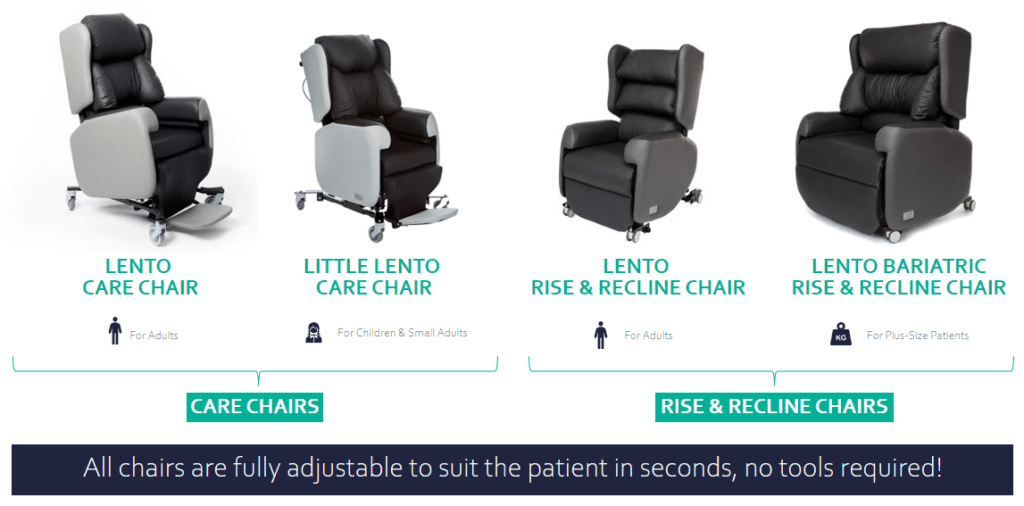
Cura Legacy
The Cura Legacy is a highly adjustable chair that features seat depth, height, width and back angle adjustments. It includes lots of positioning options to help MS patients, and is available in manual or electric action.
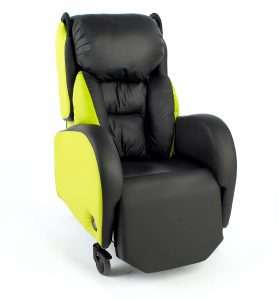
Cura Legacy chair
Rea Azalea Tilt-In-Space Wheelchair
The Rea Azalea is an attendant-propelled wheelchair with tilt-in-space, so useful for MS patients who have had relapses or are undergoing treatment in hospital. There are lots of optional accessories like seat pommels to help maintain posture and prevent sliding forward in the chair.
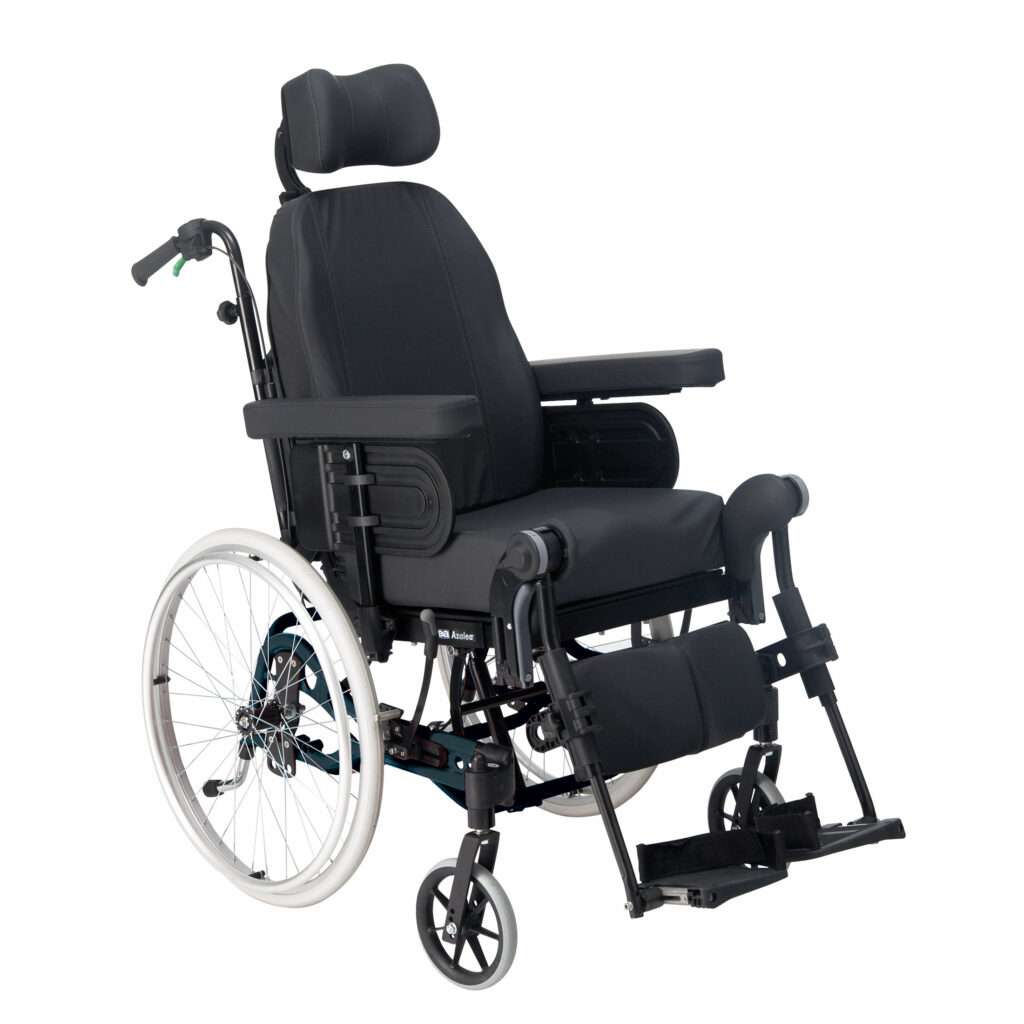
Rea Azalea wheelchair
VELA Activity Chair
The VELA Activity chair helps patients be more independent and mobile around the home, making everyday tasks more manageable. It features easy electric height adjustment at the push of a button, a solid wheelbase to glide about on, and a central brake for added security when getting in and out.
The VELA chair is perfect for using in conjunction with the arm and leg trainer, for MS patients undergoing resistance exercises to build muscle strength.
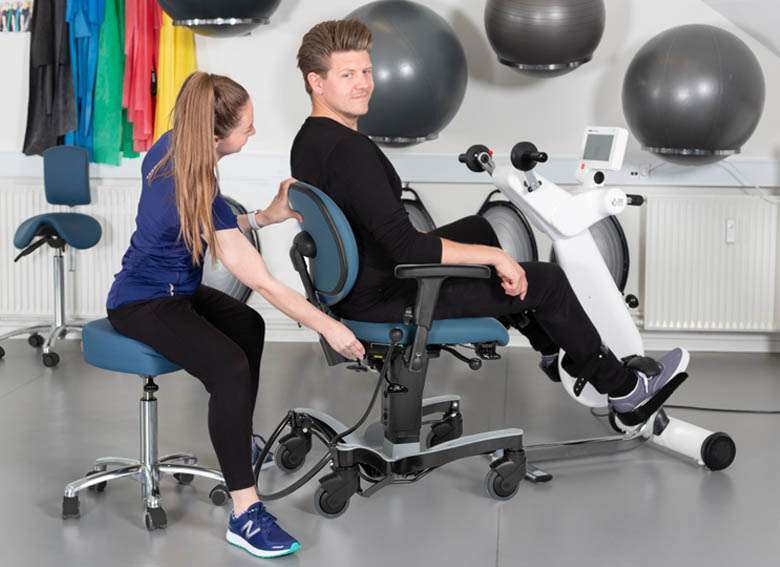
VELA Activity chair
FAQs
Is there a cure for MS?
There is currently no cure for MS, but occupational therapy and rehabilitation are two key areas which can be used to reduce symptoms and improve quality of life for MS patients.
Is pressure relief important for MS patients?
Pressure relief is an important seating feature for patients with MS, helping to relieve discomfort associated with muscle spasms and cramps, and providing pressure relief to contact areas with reduced sensory feedback.
How important is postural adjustment for MS patients?
People with MS who experience extreme fatigue and balance issues may find it hard to maintain a good posture in the chair. Building postural supports and accessories into the chair can help correct poor posture, and control muscle spasms and stiffness. There are a range of postural supports available for purchase with the Lento range.
How can seating be adapted to suit changes in MS symptoms over time?
The Lento range is fully height, width and depth adjustable, and has a range of repositioning options built into the chair. This level of adjustability makes the Lento range an ideal long-term seating solution for MS sufferers, as the chairs can be adapted as symptoms change over time.
Summary
The physical effects of MS can be well catered for by a range of different care chairs, helping MS sufferers who have poorer mobility and struggle to manage symptoms.
The adjustability in positioning and build-in width and depth adjustment are perfect for accommodating fluctuations in the condition over time, making the Lento chair range the ideal long-term seating solution for MS sufferers.
References
De Souza LH, Frank AO.
Disability and Rehabilitation. 2015;37(11):990-6. doi:10.3109/09638288.2014.949356.
Crawford SA, Stinson MD, Walsh DM, Porter-Armstrong AP.
Archives of Physical Medicine and Rehabilitation. 2005;86(6):1221-5. doi:10.1016/j.apmr.2004.08.010.



